- Faces of 2A
- SAF in the lead
- Global gun control
- Stand your ground
- Countering media bias
- Americans can win
- Strategic partnerships
- Organizing victories
- Bloomberg’s billions
- Statistical truth
- Colorado Sheriffs
- Guns in DC
- DC an ‘alien planet’
- Federal affairs
By Dave Workman | Senior Editor
One could not come away from the 2013 Gun Rights Policy Conference (GRPC) without feeling as if the enemy has been clearly identified as two people.
If it isn’t Barack Obama making moves to erode Second Amendment rights, it’s Michael Bloomberg trying to buy them away via campaign contributions and support funding for anti-gun organizations.
Alan Gottlieb, chairman of the Citizens Committee for the Right to Keep and Bear Arms (CCRKBA), led off the event observing that the road ahead “is going to look more like a Civil War battlefield than a paved highway.” Joe Tartaro, president of the Second Amendment Foundation (SAF), noted that gunowners “have been traveling a pretty rocky road for the past nine or ten months.” Gottlieb acknowledged that there will be continued assaults on firearms civil rights at the federal level.
“President Obama will not back down,” he said, “Bloomberg will not back down, the media will not back down and as gun owners we cannot back down.” Following the opening remarks, a three-member panel discussed federal legislative activities. Jeff Knox, director of the Firearms Coalition and founder of GunVoter.com, reminded the audience that they are the “gun lobby.” He also focused on the threat Bloomberg poses to the Second Amendment.
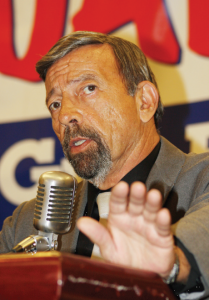
Author, self-defense expert Massad Ayoob makes a point during a GRPC panel on “Stand Your Ground” laws.
He noted the thwarting of gun control legislative efforts following Newtown. Explaining to the audience that after the Aurora, CO, “Batman massacre” and the failure to push gun control measures then, Bloomberg and other anti-gunners “waited for the next event to launch a full scale attack.” He was followed at the podium by Larry Pratt, head of Gun Owners of America. He said the way to keep gun control at bay is to cause a meltdown of telephone lines on Capitol Hill.
Mark Barnes, president of Mark Barnes Associates in Washington, DC, reminded the audience that Bloomberg has contributed more than $200 million to Johns Hopkins University “to establish, in my opinion, the world’s largest anti-gun think tank.” The university apparently plans to hire up to 40 professors “to strategize, research and write on firearms ownership,” Barnes said.
With that kind of academic activity, he cautioned, “it’s extraordinarily serious.” Veteran political writer John Fund, national affairs columnist for National Review Online and a senior editor at The American Spectator, called Washington, DC an “anti-gun alien planet.” He described the nation’s capital city as very “social,” with a population of “social engineers, socialites and socialists.” Noting that satire and ridicule are better means of beating gun prohibitionists than anger, Fund pointed to the Navy Yard shooting.
He said the gunman in that attack “did what Joe Biden wanted him to do, he went out and bought a shotgun.” Fund also said Connecticut, with the fifth toughest gun laws in the country, did not stop Sandy Hook gunman Adam Lanza.
“It would be more effective if we focused on the people at the center of these tragedies rather than the instrument with which they commit their evil deeds,” he observed.
This year’s conference featured two panels dealing with state legislative affairs. The first panel discussion led with Andrew Rothman, vice president of the Gun Owners Civil Rights Alliance of Minnesota, who told how activists stopped anti-gun legislation this year.
“We filled up the hearing room” and two overflow rooms, Rothman said, and credited the GRPC in Chicago two years ago for helping make the victory possible. He remembered a photograph of thousands of Illinois gunowners that was “such a powerful image” he brought that home to Minnesota. He was inspired to raise the same kind of crowd and descend on the capital.
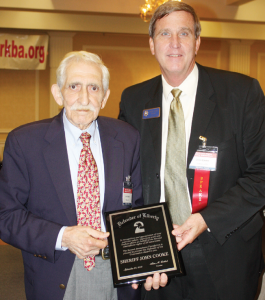
SAF President Joe Tartaro (L) presented an SAF Defender of Liberty Award to Weld County Sheriff John Cooke, lead plaintiff in Cooke et al. v. Hickenlooper, lawsuit by Colorado sheriffs against the state’s 2013 gun law.
Alice Tripp, legislative director of the Texas State Rifle Association, noted that the Lone Star State’s population growth has been a problem because all the people who will come here “bring their politics with them.” Texas gun activists have been “getting everything they can” now, she explained.
Of ten pro-gun bills filed during this year’s session, eight were passed.
Hawaii State Sen. Sam Slom, the concealed carry statute.
Philip Van Cleave, president of the Virginia Citizens Defense League, reported how the Sandy Hook tragedy in Connecticut affected Virginia, where gunowners “watched our pro-gun (legislative) agenda go up in smoke.” Virginia anti-gunners exploited the Newtown massacre and threw out all kinds of gun control legislation to see what they might get passed.
But gunowners fought back, he recalled, and all of those anti-gun measures were defeated.
Tom Bolioli, a director with Commonwealth Second Amendment in Massachusetts, described the situation in Massachusetts as challenging, but noted that the state still has not seen a post-Sandy Hook measure passed by the legislature.
Sheldon Clare, president of the National Firearms Association of Canada, lauded the US delegation to the United Nations for doing a good job, yet the Obama administration signed the international Arms Trade Treaty. He encouraged gunowners to contact their US senators and “make sure they don’t ratify” the treaty.
Sylvia Gentile, legal counsel for Federazione Italiana Storia Armi Tiro, an Italy-based gun organization, stressed the importance of making sure people understand that self-defense is a human right, and that this right must be defended.
Julianne Versnel, vice president of the International Association for the Protection of Civilian Arms Rights, said there had been details about the treaty that had not been discussed, and that a bureaucracy will be created.
Retired Maj. Gen. Allen Youngman, executive director of the Defense Small Arms Advisory Council, said the US may be the only country that recognizes self-defense, noting that “it doesn’t exist in the rest of the world.” He said it “is not likely the Senate will ratify this treaty.” Massad Ayoob, author of In the Gravest Extreme and nationallyrecognized firearms authority, explained the legal aspects of “no duty to retreat,” noting that critics of the Stand Your Ground concept misrepresent it as allowing people to kill anyone.
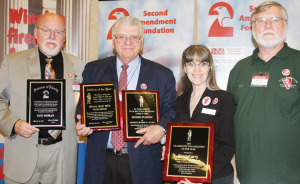
Dramatic changes in Illinois gun carry laws were the focus for award presentations at the GRPC luncheon. Shown, left to right with their awards: Don Moran, president ISRA, with SAF Defender of Liberty Award; Richard Pearson, executive director ISRA, holds CCRKBA Affiliate of the Year Award given to Illinois State Rifle Association, and his personal CCRKBA Gun Rights Activist of the Year Award, and Valinda Rowe and husband, Mike, of Illinois Carry Inc., with CCRKBA Grassroots Organization of the Year Award.
He also discussed the “reasonable man doctrine,” which considers self-defense legitimacy on the grounds that faced with the same set of circumstances, knowing what a person knew at the time, what would any reasonable person do? Ayoob told the audience that ultimately, “self-defense is the highest of all human rights. Stand your ground on it.” Author Chris Bird noted that New York Mayor Bloomberg owns a mansion in Bermuda and that when he visits there, he has armed personal security.
That’s on an island where gun ownership is strictly regulated. Attorney Alan Gura said SAF has the “leading gun rights litigation team.” However, they have a problem because many courts still do not take the Second Amendment as seriously as they should.
Many federal courts continue to resist the two Supreme Court rulings— Heller and McDonald—on the Second Amendment as protective of an individual civil right, he said.
Perhaps not surprisingly, when the afternoon sessions began, the first panel consisted of attorneys who discussed taking gun rights cases through the courts. First up was David Hardy, who followed Gura’s discussion of the standard of review. He lamented that the lower courts do not seem inclined to favor strict scrutiny when discussing the Second Amendment, though some circuits are better than others.
California attorney Don Kilmer went back over the history of the Nordyke case in Alameda County that has dragged on for 13 years.
He was followed by David Jensen, a New York litigator who has handled SAF cases including Kwong v.
Bloomberg. He told the audience, “When you sue government and say your laws are unconstitutional they don’t just roll over and agree with you. They fight.” Dan Schmutter, who represents the Association of New Jersey Rifle & Pistol Clubs, briefly explained that group’s challenge to carry permit issues. He said most people cannot meet the state standard of justification for receiving a carry permit, which “severely limits” the right to get a permit.
Attorney David Sigale from Illinois detailed the history of challenging Chicago gun laws. The city, he said, has repealed certain restrictions on guns, but the fight goes on. In the recent victory in Moore v. Madigan, which forced the legislature to adopt a carry statute, the court made it clear that one cannot simply argue that something “might” happen as grounds for preventing the exercise of a constitutional right.
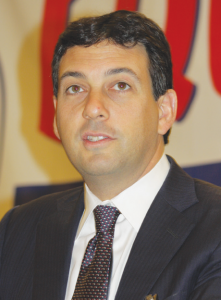
Attorney Alan Gura told the GRPC audience that many federal courts continue to resist the two Second Amendment Supreme Court rulings—Heller and McDonald—as protective of an individual civil right.
SAF general counsel Miko Tempski discussed the group’s preemption project, under which SAF has notified several municipalities in various states that their local gun ordinances are in violation of state preemption laws. The effort has been successful in Washington, Maryland and Virginia, getting about 60 gun laws off the books so far.
Author and Washington Times Senior Opinion Editor Emily Miller offered a brief presentation on her experiences in getting a gun permit in the District of Columbia. That led to her new book Emily Gets Her Gun…but Obama Wants to Take Yours. She criticized the volume of paperwork necessary just to get a permit to have a gun in the home, noting that there are 22 pages of requirements and 17 steps that must be taken.
The entire process took four months and cost Miller $435.
“Honest people can’t get a gun, but criminals are still shooting each other,” she lamented.
Gunowners will have to counter multi-million dollar advertising campaigns that Bloomberg is financing, she added, noting that “there has never been any gun control law that has reduced crime.” While gun laws may be tough in the District, out in Colorado it appears that sheriffs are tougher. Weld County Sheriff John Cooke is a leader in the sheriffs’ lawsuit against the state over this year’s package of gun control measures. Recalling that Bloomberg gave $350,000 to thwart September’s recall of two Democrat state senators that supported the gun control laws, Sheriff Cooke said he wears accusations that he has gone rogue as “a badge of honor.” “I’m not going to do a darn thing to enforce the gun laws,” he said. “I think they’re unconstitutional.” David Kopel, research director for the Colorado-based Independence Institute, noted that the September recalls “were absolutely a grassroots idea.” He said the anti-recall folks outspent the recall effort about 7-to-1, by his estimate.
“I was particularly happy to see the Bloomberg folks lose,” he said, “they’re the nastiest folks I’ve met.” Prof. John Lott, author of The Bias Against Guns, predicted that with additional funding from Michael Bloomberg to Johns Hopkins University’s Bloomberg School of Public Health research, there will be “an avalanche of gun control research.” Bloomberg contributed millions of dollars to the school, and Lott is convinced that it was for the purpose of essentially buying research favorable to more gun control.
The press, he asserted, has not been very critical of these studies. When he releases research, he said the media finds someone to challenge his findings.
Former New Jersey resident Brian Aitken delivered a riveting talk on how he ran afoul of New Jersey gun laws and ended up in prison simply for transporting a gun he legally bought in Colorado while living there.

Prof. John Lott, author of The Bias Against Guns and the pioneering More Guns=Less Crime, predicted that with additional funding from Michael Bloomberg to Johns Hopkins University’s Bloomberg School of Public Health research, there will be “an avalanche of gun control research” that the media will not be very critical of in its reporting.
Aitken was given clemency by Gov.
Chris Christie, but he still does not have his gun rights back.
He was sentenced in 2010 to seven years in prison for the gun offense, and in the process of fighting the charge, he lost his house, job, car and the court “took my son away from me.” He said this is what can happen with a patchwork of state laws that criminalize something that might be legal in another state.
Carrying firearms was also discussed by attorney David B. Moseley Jr. in relation to having guns in hotels or at places of business.
He advised armed citizens about the effort to tell businesses that you will not patronize them if they become gunfree zones.
CCRKBA Communications Director Dave Workman discussed NYC Mayor Bloomberg’s political activities and noted that the billionaire mayor believes he can buy public policy and peoples’ votes, but those things are not for sale. He also cautioned the audience that Bloomberg’s current attempts to influence gun policy in other states should be a warning that he will eventually try to tell Texans how to live as well.
Phil Watson, SAF projects director, discussed the projects he has launched, including one that exposed members of Mayors Against Illegal Guns for crimes they have committed.
He has also asked for documents under New York law that might reveal how Bloomberg’s office may have misused city-owned computers to support MAIG activities.
Author Alan Korwin discussed the “big tent” philosophy and the importance of using the right words in discussion. Someone who is pro-gun should be “pro rights” and that wins arguments because it frames antigunners as anti-rights.
But his primary message was about the potential benefit to the gun rights cause that amnesty might provide.
People who become citizens get to exercise their Second Amendment right, and that will ultimately favor the gunowner side of the Second Amendment debate.
Gottlieb was back at the podium for an afternoon discussion on winning the 2014 mid-term elections. He said there are five specific things to watch as the election draws near, and gun rights is not one of them. He listed the president’s approval rating, consumer confidence, Obamacare, Democrat and Republican favorability ratings, and the congressional ballot test.
CCRKBA Legislative Director Joe Waldron recalled what happened after Columbine, where gun control passed in the Senate but stalled in the House because there was no agreement on background checks.
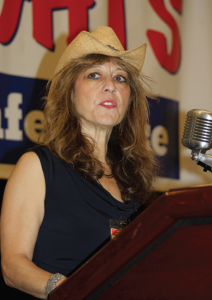
Beverly Zaslow, the executive producer for PolitiChicks.TV, who also produced “Runaway Slaves,” a film about black conservatives in the US, stressed that gun rights activists should use the new media avenue to counter the established media.
He also said Michael Bloomberg is losing members of his Mayors group because they are tired of being used to help push his anti-gun agenda.
Richard Pearson, executive director of the Illinois State Rifle Association, counseled the audience to work on districts where the vote may be thin, but it is important to get activists out anyway. These districts can be identified and that helps people organize where their efforts should be spent.
“One of the things we are always looking for is the pure, perfect candidate,” he warned. “They don’t exist. If you have the pure, perfect candidate and he can’t get elected, you’ve got nothing.” Joe Tartaro offered tips on enlisting new people in the gun rights battle. He noted that “we are competing against youth activities and video games” when dealing with young shooters, and maybe even older ones.
He visits with neighbors during block parties and other activities, and he finds that they are interested in getting started but they do not know how. He learned from years in advertising that the key is to satisfy a need. Get them shooting first, he advised, and then start selling them on gun rights.
Michael Saporito, general counsel for the Civilian Marksmanship Program, stressed youth involvement and suggested getting involved in local politics to influence the opinions of politicians.
Thomas Bolioli, with Commonwealth Second Amendment in Massachusetts said his group has built alliances and has done litigation and education, but no lobbying. They have cases in state and federal court. Two of their current cases are funded by the NRA, one by SAF and one that has already been won was also funded by SAF.
Peter Jay Gould, executive producer of “Infringed: Second Amendment in the Crosshairs,” told the audience that too many people have “grown complacent.” He said public opinion can destroy all gun rights victories, particularly with a tragedy like Sandy Hook, after which public opinion shifted on gun control, albeit temporarily.
Eric Reed with Gun Rights Across America said the Second Amendment is about protecting yourself, even from the government if it becomes tyrannical.
Andrew Sypien, content manager for Cheaper Than Dirt, worked at CBS prior to his entry into the outdoors. He said the “new media” is where gun rights activists will find a new audience.
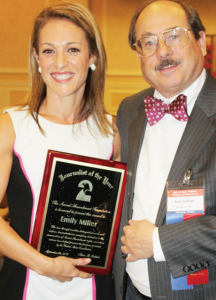
Emily Miller, senior opinion editor of the Washington Times, was presented with the SAF Journalist of the Year Award by SAF Founder and Executive Vice President Alan Gottlieb. Miller has a new book out: Emily Gets Her Gun—But Obama Wants to Take Yours.
“To grow, you have to find new blood and change your demographic,” he advised. It’s what Cheaper Than Dirt has done. He also said it is important to entertain readers of Facebook pages and other types of messages.
Beverly Zaslow, executive producer of PolitiChicks.TV, recalled that the late Andrew Breitbart understood the new media. She said people should use the new media and they need to know how to use it.
Calling herself a “political junkie,” Zaslow produced “Runaway Slaves,” a film about black conservatives in the United States.
Peggy Tartaro, editor of Women & Guns, described how she discussed gun ownership with people in her own community by noting that she was from the neighborhood.
She said to never turn down an invitation to some function, look for areas where you find common ground and understand that you will not make converts.
Charles Heller, executive director of Jews for the Preservation of Firearms Ownership, said that humor is important when addressing an audience. At the same time, he cautioned against “exceeding fact” when speaking to people.
He encouraged the audience to “adopt” someone and take them shooting.
Doug Ritter with Knife Rights discussed his organization’s legislative victories, which are numerous for a group that is only four years old. He reminded listeners that the Second Amendment is about arms, not just firearms.
“Failing to pass legislation only means you come back smarter and harder the next time around,” he advised.
The Rev. Anthony Winfield, chaplain at New York City’s Elmhurst Hospital, discussed his personal history of getting involved in the gun rights movement. He has educated people about the racist roots of gun control, and how registration lists have been used against gunowners.
Dr. Timothy Wheeler, director of Doctors for Responsible Gun Ownership, a project of SAF, briefly recounted the history of using public health reasons to attack gun rights.
Wheeler recalled when the Centers for Disease Control (CDC) was criticized for agenda-driven research Congress withheld funding for such studies. This trend began back in the mid-1990s under the Clinton administration with tax money being used for what he called “advocacy research” which amounted to anti-gun advocacy.
Earlier this year the Obama administration showed interest in restoring funding to CDC for more advocacy research, Wheeler recalled.
At the same time, Mayor Bloomberg contributed a small fortune to the Johns Hopkins Bloomberg School of Public Health, apparently for the same kind of anti-gun research, he asserted.
Wheeler was critical of the veterans of this research, noting that Constitutional rights “are not on the radar screen of these people.
Richard Feldman, president of the Independent Firearms Owners Association, told the audience that gun control is “about power” and that when the government no longer trusts people with firearms they’ve never misused, “they’re no longer worthy” of the public’s trust.
Mark Vanderberg with the Gun Rights Radio Network recalled his first visit to a gun rights conference and that when it was finished, he was “inspired to go home and do something.” He became determined to spread the gun rights message and he began gun rights podcasts and worked on organizing the grassroots.
The mainstream press is anti-gun, according to experts on the next panel.
Malia Zimmerman, editor of the Hawaii Reporter, said the most direct way to overcome this is to “start your own media.” She said a lot of times, reporters merely need to be exposed to firearms and gunowners. She encouraged people to establish relationships with reporters and become reliable, available sources when stories about firearms come up, and to offer ideas about other stories as well.
Herb Stupp, a CCRKBA director and media professional, said that people can see the bias in the mainstream press, and that there are different kinds of bias. He criticized reporters who are “lazy and maybe cocktail party antigunners,” for not digging out facts.
If a reporter is irresponsible or biased, he suggested speaking to the news editor.
Kevin Price, a talk show host on KTEK, told the audience that “the media is the enemy.” Quoting the late Andrew Breitbart, he criticized the “bizarre media culture we live in” that “makes me look like an activist.” He also asserted that “academia hates America.” He said academia and the media are driven by the Left. He contended that the Left “swallowed the media in the 1970s.” Gottlieb and Tartaro closed the conference by announcing that the 2014 event will be held in Chicago.



